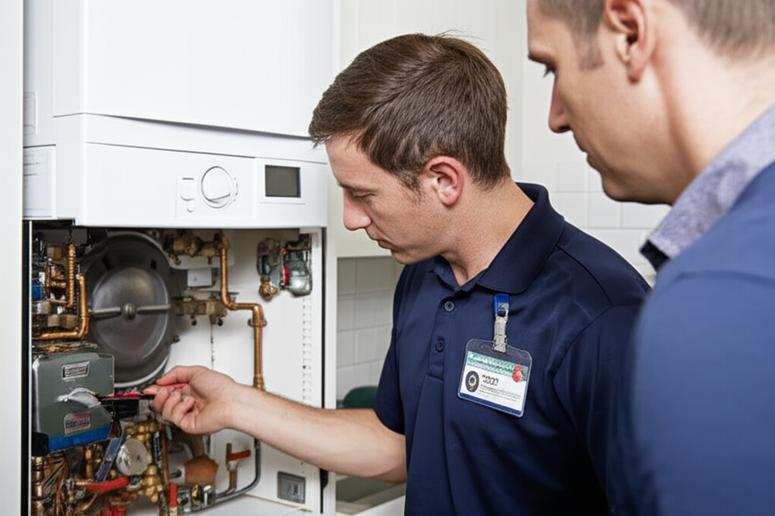Let’s be real, gas safety in your UK rental property isn’t just another thing to tick off a list. It’s actually a fundamental commitment to keeping your tenants safe and, well, a pretty crucial legal obligation for you as a landlord. Every single year, countless folks rely on gas appliances in their homes, which makes a thorough Gas Safety Check for Landlords an absolute must-do. And guess what? In 2025, these checks are just as vital as ever, acting as a real cornerstone for safety and compliance in the rental world.
Making sure your property’s gas systems are running safely isn’t just about following rules; it’s a moral imperative. You’re literally protecting lives from those invisible dangers like carbon monoxide poisoning and gas leaks. Beyond the ethical side, there are super strict regulations that govern what landlords need to do, and the penalties for not sticking to them can be pretty significant. This article is going to dive deep into why these checks are a non-negotiable “must-do” in 2025 and beyond, breaking down the legal stuff, how the inspections actually work, and the serious consequences if you neglect this super important duty.
Understanding Your Legal Obligations: The Foundation of Gas Safety for Landlords
For landlords in the UK, getting a grip on gas safety regulations isn’t just about good practice; it’s the legal bedrock that all your responsibilities are built upon. These rules are put in place to shield tenants from all the risks that come with gas appliances and installations. Being compliant means both your occupants are safe and your legal standing is rock-solid.
So, what’s the big rulebook we’re talking about? It’s called the Gas Safety (Installation and Use) Regulations 1998. This is the main legislation that pretty much dictates everything about gas safety in rental properties. It clearly spells out what landlords need to do, requiring you to make sure all gas appliances, fittings, and flues you provide for your tenants are kept in tip-top, safe condition. That includes things like gas boilers, cookers, and fires. And when we say “landlord” under these regulations, it’s a broad definition—think local authorities, housing associations, private landlords, and even folks who provide accommodation as part of a job. That just goes to show how widely these critical safety rules apply!
The 2018 Amendment: Flexibility in Your Annual Gas Safety Inspection
While those 1998 regulations laid down the groundwork, the Gas Safety Regulations (Installation and Use) (Amendment) 2018 actually introduced a really welcome bit of flexibility for landlords. This amendment, often referred to as the “MOT-style” allowance, lets you carry out your annual gas safety inspection up to two months before its actual due date. The cool part? This early check doesn’t mess with the original anniversary date, so you get this really smooth transition between certificates. Pretty handy, right?
This flexibility is a game-changer, honestly. It just makes planning and scheduling your inspections so much easier, taking away that last-minute scramble and stress. It helps make sure you’re always compliant and stops you from accidentally missing a deadline because of scheduling headaches. For instance, if your inspection is due on October 31st, you can now arrange it as early as September 1st, and your next one will still be due by October 31st the following year. How good is that for peace of mind?
Mandatory Annual Gas Safety Checks: What the Law Demands
The law is super clear on this: every single gas appliance and flue you provide in your rental property *must* have a mandatory annual gas safety check. This yearly requirement is non-negotiable and applies to every single gas appliance within the rental property. The Health and Safety Executive (HSE) makes it totally clear that landlords are responsible for the safety of any gas appliances they own and provide for their tenants.
These checks are absolutely vital for spotting any potential issues, like leaks or faulty parts, before they turn into genuinely dangerous situations. And here’s another thing: you need to keep these records for at least two years and give copies to your current tenants within 28 days of the check. For new tenants, they need a copy before they even move in. That’s a strict legal requirement, as GOV.UK points out. Seriously, neglecting this annual inspection can lead to some severe consequences, putting your tenants’ safety at risk and opening you up to some pretty hefty legal penalties.
What Does a Comprehensive Gas Safety Check Entail?
A comprehensive gas safety check goes way beyond just a quick look-over; it’s a super meticulous examination designed to find and fix any potential hazards connected with gas appliances. This thorough process ensures that every single component is working safely and efficiently, giving both landlords and tenants some much-needed peace of mind. And let’s be clear: the quality of this check relies heavily on the expertise of the person doing it.
The inspection itself covers a whole range of critical elements to guarantee your gas system is safe. This includes a visual check of all gas appliances, followed by tightness tests at the gas meter to sniff out any leaks in the pipework. They’ll do gas rate and burner pressure checks to make sure appliances are running correctly, and flue gas analysis to assess how efficiently things are burning and confirm that dangerous gases are being safely expelled. Ventilation assessments are also a big deal to ensure there’s enough airflow, which prevents harmful fumes from building up. Finally, all safety devices get a thorough check to ensure they’re working. These checks cover common appliances like boilers, cookers, and gas fires—all those essentials for a safe home.
The Indispensable Role of a Gas Safe Registered Engineer UK
When it comes to gas safety, there’s absolutely no room to cut corners on expertise. Only a certified Gas Safe registered engineer UK is legally allowed to carry out these vital inspections and any related gas work. This is a crucial distinction, because Gas Safe registration means an engineer has gone through rigorous training and assessments, proving they’re competent and stick to really strict safety standards.
Verifying an engineer’s credentials is super straightforward and totally essential. Every Gas Safe registered engineer carries an ID card, and you should *always* ask to see it. This card will show their photo, a unique license number, and the specific types of gas work they’re qualified to do—like domestic natural gas or LPG. Relying on someone who isn’t registered for gas work is not just illegal; it’s incredibly dangerous, putting your tenants and your property at severe risk. Trust me, it’s not worth it.
Addressing Unsafe Appliances: Immediate Action and Remedial Steps
So, during a gas safety check for landlords, what if a Gas Safe registered engineer finds appliances that aren’t operating safely? These unsafe appliances get classified based on how much risk they pose. For example, an appliance might be deemed “Immediately Dangerous (ID)” if it’s an immediate threat to life or property, meaning it needs to be disconnected right away. An “At Risk (AR)” classification means there’s a fault that *could* become dangerous if it’s not sorted out, so it needs urgent repair or replacement.
If an appliance fails the safety check, you as the landlord have clear responsibilities. The engineer will explain the classification and what needs to be done to fix it. For “Immediately Dangerous” appliances, disconnection is mandatory – no ifs, buts, or maybes. For “At Risk” appliances, you’ll need to arrange for those necessary repairs or replacements to be done promptly by a Gas Safe registered engineer. Seriously, failing to act on these recommendations can lead to severe legal problems and, more importantly, put your tenants’ lives on the line.
The Gas Safety Certificate (CP12): Your Proof of Diligence and Safety
Now, let’s talk about the **Gas Safety Certificate** – you probably know it as a CP12. It’s way more than just a bit of paper; it’s your solid proof that you’re totally on top of gas safety regulations and genuinely care about your tenants’ well-being. This document serves as a comprehensive record of the annual inspection, detailing absolutely everything about the gas system in your rental property. It’s an essential legal requirement and a critical part of your landlord duties.
The CP12 certificate packs a ton of essential information, giving you a crystal-clear overview of your property’s gas safety status. It includes the name and registration number of the Gas Safe registered engineer who did the inspection, the date of the check, and the property’s address. Crucially, it lists every single gas appliance inspected, detailing the results of the various checks performed, like gas rate, burner pressure, and flue gas analysis. Any faults found, along with recommended fixes, are also meticulously recorded, ensuring a totally transparent and accountable record of the inspection. It’s your safety story, all laid out.
Your Responsibilities for Issuing and Retaining Records
As a landlord, your responsibilities don’t just stop at getting a CP12 certificate; you also need to make sure it’s properly issued and kept safe. For new tenants, you’re legally required to hand them a copy of the valid gas safety certificate before they even move in. For existing tenants, a copy of the renewed certificate must be supplied within 28 days of the annual inspection being completed. Pretty specific, right?
On top of that, the law says you need to keep a copy of the gas safety certificate for at least two years. However, many experts (and honestly, I’d agree) advise holding onto these records for the entire time you own the property. Why? Because they can be crucial evidence of your compliance if any issues ever pop up. This diligent record-keeping is absolutely vital for showing your commitment to gas safety and can be invaluable for legal or insurance claims down the line.
Electronic Records: Modern Compliance for Landlords
In today’s digital world, here’s some good news for landlords: gas safety records can totally be kept electronically! This is a super convenient and efficient way to manage all your compliance documents. However, there are some specific rules to make sure they’re valid. Electronic records must be able to be printed out as a hard copy if needed, and they absolutely have to be secure to stop anyone from tampering with them or losing them.
Crucially, each electronic record must uniquely identify the gas operative who carried out the inspection. This ensures accountability and makes it easy to verify the engineer’s credentials. The move towards digital records really streamlines the process for many landlords, making it simpler to store, access, and provide those certificates to tenants just as the law requires. Handy, isn’t it?
Beyond the Check: Navigating Common Gas Safety Scenarios
While that annual gas safety check is absolutely paramount, landlords often run into different situations that need extra attention to make sure you’re always compliant and your tenants are safe. Handling these common scenarios effectively is key to maintaining a secure rental property and avoiding any potential headaches. From sorting out access for inspections to understanding carbon monoxide alarm rules, being proactive is always your best bet.
For example, getting access to a property for an annual gas safety inspection can sometimes be a bit tricky. You should communicate clearly and well in advance with your tenants, giving them plenty of notice about upcoming inspections. It’s super important to document all your attempts to contact tenants and arrange access, especially if you hit any difficulties. In cases where tenants consistently deny access, you need to be aware of the legal limitations around forced entry and definitely seek professional advice if you find yourself in that spot. Understanding the nuances of these situations helps you stay compliant while still respecting tenant rights.
The Importance of Carbon Monoxide Alarms: A 2022 Update for England
Carbon monoxide (CO) is truly a silent killer—it’s an odorless, colorless gas that can be fatal. Recognising just how dangerous it is, the law in England got an important update on October 1, 2022. Now, landlords are legally required to install a working carbon monoxide alarm in any room used as living accommodation that contains a fixed combustion appliance. This specifically excludes gas cookers, which generally aren’t considered fixed combustion appliances in this context. Good to know, right?
This expanded requirement really hammers home the life-saving role of CO alarms. These little devices give an early warning of carbon monoxide’s presence, letting tenants take immediate action and potentially preventing serious illness or even death. For landlords, making sure these alarms are correctly installed and regularly tested isn’t just a legal duty, it’s a vital step in protecting your tenants’ health and safety. It’s peace of mind in a small package.
Tenant-Owned Appliances vs. Landlord Responsibilities
Here’s a common area where landlords can get a bit confused: who’s responsible for tenant-owned gas appliances? While you, as the landlord, are definitely responsible for any gas appliances you provide, along with the associated pipework and flues, the responsibility for appliances owned by the tenant usually falls to them. But here’s the thing: this distinction isn’t always totally black and white.
You’re still responsible for the gas supply and pipework leading to those tenant-owned appliances. And honestly, it’s best practice to gently remind tenants to get their own gas appliances serviced regularly. You could even offer to include these appliances in the annual gas safety check, if the tenant agrees. Taking this proactive approach really helps ensure overall gas safety within the property and, let’s face it, fosters a pretty good relationship with your tenants too.
Understanding the Gas Safety Certificate Cost UK: An Essential Investment
Let’s be real, there’s always a cost involved, and the Gas Safety Certificate cost UK is definitely one of those unavoidable expenses for landlords. But trust me, it’s a super important investment in safety and compliance. Prices can bounce around a bit depending on several factors, including how many gas appliances are in the property, the engineer’s rates, and where you’re located. For example, a check for a single appliance might start from around £35, with extra appliances costing a bit more per Landlord Certificate.
While it’s natural to want a good deal, your main focus should *always* be on getting a qualified Gas Safe registered engineer. Comparing quotes from a few reputable engineers is a smart move. Ultimately, the cost of a gas safety certificate is a small price to pay for the incredible peace of mind that comes with knowing your property is safe and compliant. It prevents potentially devastating incidents and those hefty fines, so it’s totally worth it.
Severe Consequences of Non-Compliance: Protecting Lives and Livelihoods
Look, neglecting that mandatory Gas Safety Check for Landlords isn’t just a tiny oversight; it comes with some seriously heavy consequences. We’re talking about stuff that goes way beyond a simple administrative slip-up. Non-compliance doesn’t just put tenants’ lives at risk; it also exposes landlords to significant legal, financial, and even reputational damage. The UK legal system takes gas safety incredibly seriously, and rightly so, considering the potentially catastrophic outcomes of negligence.
The repercussions for failing to stick to gas safety regulations can be absolutely dire. Landlords face hefty fines, which, in serious cases, can be unlimited. On top of the financial hits, there’s the very real possibility of imprisonment for up to six months. You could also be slapped with prohibition or improvement notices, demanding immediate action to fix things. These legal ramifications really drive home how critically important regular gas safety checks and proper maintenance are. This isn’t a responsibility you can take lightly, folks.
Impact on Tenancy and Eviction Processes: Section 21 Invalidity
Beyond the immediate legal penalties, not complying with gas safety regulations can seriously mess with your tenancy management and even eviction processes. Here’s a crucial point for landlords to grasp: failing to provide a valid gas safety certificate to tenants before they move in, or within 28 days of a renewed inspection, can actually invalidate a Section 21 ‘no-fault’ eviction notice. Yep, you read that right.
This means that even if you have totally legitimate reasons for wanting your property back, you might not be able to use the Section 21 process if you haven’t done your gas safety bit. That can lead to drawn-out and costly legal battles, making an already tough situation even harder. So, ensuring you’re continuously compliant with gas safety requirements is absolutely essential for keeping effective control over your tenancy agreements and eviction rights. It’s a foundational step, really.
Moral and Reputational Damage: Beyond Legal Penalties
While fines and jail time are pretty tangible penalties, the moral and reputational damage from gas safety negligence can be just as, if not more, devastating. As landlords, we have a fundamental ethical responsibility to provide safe homes for our tenants. If something awful happens—like a carbon monoxide leak or a gas explosion—because you missed a gas safety check for landlords, the human cost can be immense, leading to serious injury or even death.
An event like that wouldn’t just result in severe legal action; it would cause irreparable harm to your reputation. The negative publicity and public scrutiny could deter future tenants and damage your relationships with letting agents and other key players. Seriously, being committed to gas safety is a commitment to the well-being of others, safeguarding both lives and livelihoods. It’s about doing the right thing, plain and simple.
Conclusion: Prioritising Gas Safety in 2025 and Beyond
In 2025, and truly for all the years to come, that annual Gas Safety Check for Landlords remains an absolute cornerstone of tenant safety and legal adherence here in the UK. It’s more than just ticking boxes; it’s about making a crucial commitment to the well-being of everyone living in your rental properties. The rules are clear, the process is well-established, and the consequences of slipping up are severe, really underlining that this annual inspection is non-negotiable.
So, here are the simple, yet profound, takeaways for you as a landlord: always uphold your legal obligations by arranging that yearly check, make sure it’s professionally done by a Gas Safe registered engineer UK, keep clear and easily accessible documentation with that CP12 certificate, and fully understand the severe repercussions if you don’t comply. An unwavering commitment to gas safety not only shields you from hefty fines, potential imprisonment, and invalid eviction processes but, most importantly, gives you invaluable peace of mind, knowing you’ve truly safeguarded the lives within your property.
CTA: Secure Your Property’s Gas Safety Today
Don’t leave gas safety to chance. Be proactive and schedule your next annual gas safety inspection well in advance to ensure continuous compliance and peace of mind for your tenants. Always, always choose a qualified Gas Safe registered engineer UK for all gas work, making sure you verify their credentials to guarantee expertise and adherence to safety standards. Your proactive approach doesn’t just fulfill your legal duties; it actively protects your tenants and your investment. Got any thoughts or experiences to share? Or maybe some questions? Drop them in the comments below! Your insights could really help out other landlords trying to keep their properties safe.










